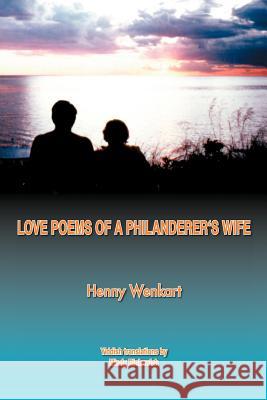Love Poems of a Philanderer's Wife » książka
Love Poems of a Philanderer's Wife
ISBN-13: 9780972456593 / Yiddish / Miękka / 2007 / 168 str.
Love Poems of a Philanderer's Wife by Henny Wenkart, translated by Mindy Rinkewich She is a secure little Jewish girl, daughter of a lawyer in beautiful Vienna before the Nazis - a city full of palaces, parks and music. He is a litle boy in Nazi Frankfurt, where Jews like him are already beaten up, and all little boys, even Jewish ones, admire the tall, black-clad SS. Both families come ot America, where at first theya re very poor. The boy and girl grow up knowing one another and later, in college, fall in love. But German Jews don't like Jews from Vienna. He is not supposed to date, much less marry, her. So they elope, love each other, work hard, give grandchildren to their parents, are faithful to each other, and for a long time all seems well. His father always taught him that real men are not monogamous. The young couple think this is nonsense - at least, she believes that they both think this. Very gradually she starts to sense that something is wrong - then WHAT it is - then WHO it is. Nowadays first wives don't die young, as they did centuries ago. They live and sometimes are discarded for "arm candy" - and they, not the candy or the man, are supposed to feel shame. These poems develop the courage and good sense to reject that role. Born in Vienna, Henny Wenkart arrived in the United State on a children's transport. She was educated at Pembroke College, Columbia University (M.S.), Radcliffe (M.A.) and Harvard (Ph.D.). She taught both Philosophy and Writing at Harvard and at Stern College for Women of Yeshiva University. She and her German-Jewish husband have three married children and a number of grandchildren. Henny is Editor of the Jewish Women's Literary Annual and the anthologies Sarah's Daughters Sing and Which Lilith? Her translation and re-editing of Pauline Wengeroff's nineteenth-century memoir was a finalist for the Jewish Book Award and has been translated into Russian. Her papers about the philosopher George Santayana appear in scholarly journals, her poems in literary magazines. She often lectures at various universities; is writing a novel. The Jewish Women's Poetry Workshop she leads in New York has been meeting every month for two years. CYCO, the publishing arm of the Congress for Jewish Culture, is one of the oldest Yiddish publishing houses in continuous operation; and is New York's oldest and currently only book store dedicated exclusively to Yiddish.











